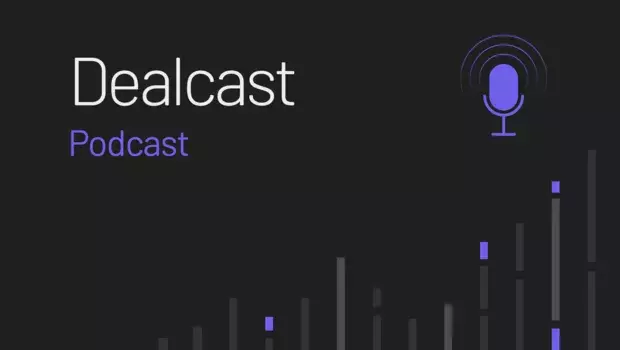In this week’s episode, we’re looking at EMEA M&A trends in the first half of 2022 and the comparison to recent years with Jonathan Klonowski, M&A market insight analyst at Mergermarket. Dealcast is presented by Mergermarket and SS&C Intralinks.
In this episode, you’ll learn about:
- M&A and private equity deals in EMEA vs. global dealmaking in the first half of 2022
- How energy policy shifts have impacted Oil, Gas and Renewables
- Active sectors to watch in the region
- How despite uncertainty and headwinds M&A dealmakers are resilient
- New trends in EMEA to watch in the next six months
Transcript
JULIE-ANNA NEEDHAM: Welcome to Dealcast, the weekly M&A podcast presented to you by Mergermarket and SS&C Intralinks. I'm Julie-Anna Needham, a business journalist who's been covering M&A for a decade. In this episode, I'm joined by Jonathan Kalinowski, M&A market insight analyst, to learn about EMEA M&A trends in the first half of this year. Hi, Jonathan. Thanks very much for joining me today.
JONATHAN KALINOWSKI: Hi there, hi.
JULIE-ANNA NEEDHAM: So to begin with, can you give us an overview of EMEA M&A trends in the first half of 2022 and give us an idea of how that compares to recent years, please?
JONATHAN KALINOWSKI: Absolutely. So EMEA M&A, the way that we describe it was bloodied but not out. So if you look at M&A so far this year, it's down by around 13 percent compared to the first half of 2021, so just over USD 600 billion spent across 5 and 1/2 thousand deals. It's important to note that 2021 was really extraordinary year, a record-breaking year. And so it was to be expected that there was going to be a bit of a downturn.
There was a lot of pent up demand after the pandemic, which resulted in a huge amount of activity in 2021. And it also has to be noted that dealmakers are fighting a lot of uncertainty both in EMEA with a lot of geopolitical uncertainty, and dealing with inflation. So I think what we can see is a fair amount of resiliency in the M&A market, also compared to other capital markets, as well, I know that debt markets and ECM markets have been struggling a lot more than M&A.
JULIE-ANNA NEEDHAM: And how does EMEA compare to global M&A?
JONATHAN KALINOWSKI: A similar story really, that EMEA has been a lot more resilient than global M&A. So I mentioned, EMEA is down by around 13 percent. Global M&A was down by just over 20 percent. So again more resiliency in EMEA than globally, but let's see how long that lasts.
JULIE-ANNA NEEDHAM: And what explains those figures or that difference?
JONATHAN KALINOWSKI: Well, I think private equity has played a huge part in M&A so far this year, both in EMEA and globally. But particularly in EMEA if you look at the top deals, a lot of those have come from private equity, and it's one area where we haven't really seen a downturn despite the difficulties may be in financing. We have seen fundraising drop a little bit this year. Private equity firms are still very much awash with dry powder and they're putting that to use. The trends that we've seen over recent years of financial sponsors spending increasingly more on bigger and bigger targets have continued. We've seen a continuation of private equity firms looking at listed firms. Just in these last couple of weeks, we've seen the Euromoney deal, which again a continuation of trends this year and from previous years.
JULIE-ANNA NEEDHAM: So can you give us some of the headline figures and talk through some of the major deals that private equity has been involved in the first half of 2022, please?
JONATHAN KALINOWSKI: Yeah. So in the first half in EMEA, there was just over USD 160 billion spent by private equity firms. This accounts for around 28 percent of the total value in EMEA, which if you compare it to the entirety of 2021 is up from 22 percent. The main deal to talk about really is Blackstone and [INAUDIBLE] at USD 46.6 billion deal of Atlantia, which is the largest LBO registered by Dealogic on record in EMEA.
JULIE-ANNA NEEDHAM: Looking at sectors in EMEA, what have been the sectors that have seen a lot of activity and what have been the sectors that haven't seen much deal activity at all?
JONATHAN KALINOWSKI: Unsurprisingly, tech continues to be the most active sector. That's been a trend of recent years. So that accounts for around 30 percent of deals in EMEA by the number of deals. Again, by value, it remains one of the most active sectors. As I said, it's a continuation from recent years where we've seen both sponsors and corporates look to invest in technology, particularly the more traditional sectors have been very active in this space to counteract newer more innovative firms.
On the other end, I think one of the most interesting sectors to monitor at the moment has been energy, obviously, because of events in Ukraine. Energy policy in Europe has shifted quite significantly. And we've seen M&A in the oil and gas sector reduce quite significantly. It was down by over 50 percent in the first half compared to the first half of last year. And then we've also seen quite a significant uptick in M&A in the renewables space. So again that change in energy policy is definitely having an effect on the M&A markets.
JULIE-ANNA NEEDHAM: So energy and tech are kind of two opposite ends of activity for the sectors. What other sectors are interesting and you're seeing lots of activity and/or just worth noting or keeping an eye on for the future?
JONATHAN KALINOWSKI: I think consumers is a really interesting one. We've seen some really notable shifts in that over recent years. Spaces like e-commerce have really taken over. And so that's one where we're-- e-commerce is one where we're seeing a marked increase in activity.
JULIE-ANNA NEEDHAM: So to round up, can you tell us what trends you're expecting to see, continue or new trends, in the next six months?
JONATHAN KALINOWSKI: I think over the next six months, the big thing to watch out for again is private equity. We know that they are, as I said before, still awash with cash. And we've seen a continuation of that increased intake private already in Q3. So I think that's something that will continue to drive the M&A markets in EMEA. I think there are obvious areas of concern for deal makers, the levels of inflation, the threat of a recession, and the troubles in raising debt are definitely areas that will be of concern to dealmakers. So it wouldn't be a surprise to see M&A fall over the coming months.
JULIE-ANNA NEEDHAM: Great. Jonathan, thank you very much.
JONATHAN KALINOWSKI: Thank you.
JULIE-ANNA NEEDHAM: That was Jonathan Kalinowski, M&A market insight analyst. Thanks for listening to this week's episode of Dealcast presented by Mergermarket and SS&C Intralinks. Please rate, review, and follow the podcast. You can find us on Apple Podcasts, Spotify, or look out for your Mergermarket news alert. For more information, check out our show notes. Join us next week for another episode.



